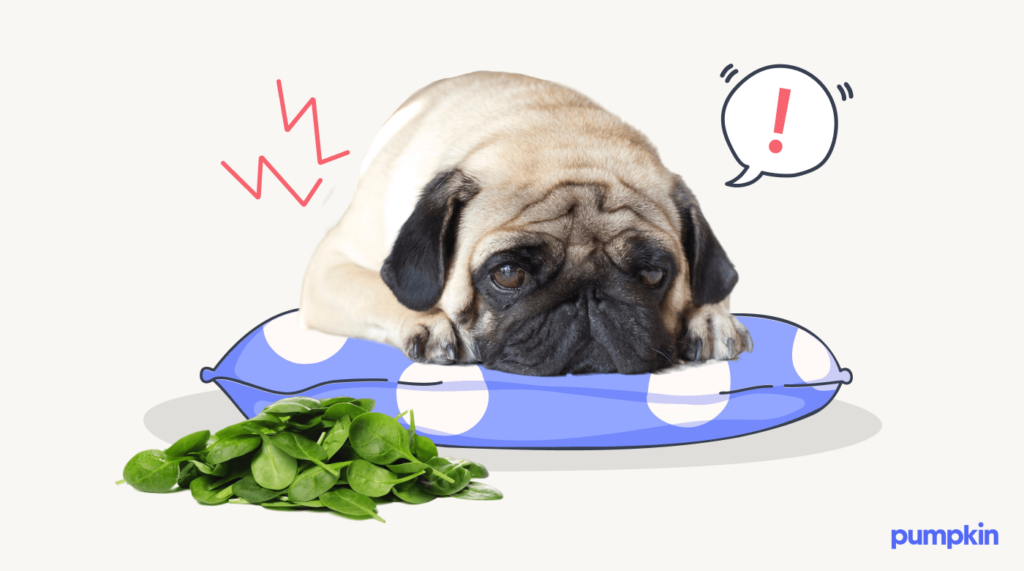- Lynn Guthrie
- Aug 19, 2021
- 5 min read
Updated: Jun 26
.entry-content ul {
margin-left: 50px;
}
.call-out-container ul {
margin-left: 0px !important;
}
Key Points:
Yes, dogs can eat spinach in small quantities; about 1 to 3 tablespoons of cooked spinach is ideal.
Spinach provides dogs with vitamins A, B, C, and K, iron, and antioxidants.
Cooking spinach makes it easier for dogs to digest.
If spinach works wonders for Popeye, you might be curious if it could also be a superhero-like superfood for your pet. Many human foods do have nutritional benefits for dogs, but is spinach one of them? Should dogs, who evolved from carnivorous wolves, eat spinach?
In short, yes, dogs can eat spinach.
However, it's important to understand both the perks and potential risks before going full Popeye.
In this guide, we explore the nutritional benefits of spinach and explain why this leafy green can be a wonderful (albeit occasional) addition to your pooch’s dinner bowl.
Spinach is a vitamin-packed treat
Spinach originates from Persia and is part of the amaranth family along with beets and quinoa. It's a leafy vegetable that packs a nutritious punch for people and pups.
Spinach is a rich source of vitamins and minerals such as:
Vitamin C and E: These support your dog’s immune system, reduce inflammation, and protect the brain from the effects of aging.
Vitamin A: Beta-carotene and vitamin A support your dog’s vision.
Folate: Also called vitamin B9, folate is important for red blood cell production and healthy cell growth.
Vitamin K: This vitamin is essential for the blood’s ability to clot.
Minerals: Spinach contains potassium, magnesium, manganese, copper, and iron, which support your dog’s bone and nerve health.
Additionally, there are two types of fiber found in spinach.
Soluble fiber: This plant fiber dissolves in water, turning into a gel-like substance. This gel feeds good bacteria in your dog’s gut, boosting their digestive health.
Insoluble fiber: This fiber doesn’t dissolve in water and isn’t digestible. However, because it stays intact, it can help move waste through the digestive tract and add bulk to stools.
Fiber also aids in weight management by keeping your dog full for longer, which can have long-term benefits for their heart health.
So, if your dog is happy chowing down on a bowl of spinach, should you let them? To get the most value without the risk, extra treats should make up no more than 10% of a dog’s daily calories.
Pet Pro Tip:If you have a dog that is prone to ‘snacksidents’ – you should consider getting a dog insurance plan as soon as possible. It can help you afford the best care in the future by covering eligible vet bills for digestive illnesses, toxic ingestion, and more.
What are the risks of spinach for dogs?
While spinach is packed with beneficial nutrients, there are risks if your pooch consumes too much. The primary concern lies with oxalates, which are compounds found in raw spinach that can disrupt your dog's metabolism.
Oxalates and your dog’s metabolism
Raw spinach leaves contain high levels of oxalates, which can lead to the formation of calcium oxalate crystals in your dog’s body. These crystals inhibit calcium absorption and accumulate in the kidneys, potentially causing kidney stones, bladder stones, and even kidney damage.
Dogs with kidney disease or related health issues such as urinary infections should never consume spinach.
If you’re concerned that you may have fed your dog too much spinach, here are signs of oxalate stones to look out for:
Difficulty urinating
Blood or cloudiness in urine
Foul-smelling urine
Increased frequency of urination
Swollen abdomen
Loss of appetite
Behavioral changes
Fatigue or lethargy
Vomiting
If your dog shows any of these symptoms, make sure they drink plenty of water to help flush their system and consult your vet immediately.

Sodium
Spinach has a relatively high sodium content for dogs, with 100 grams of these leafy vegetables containing 70 mg of sodium. This is particularly problematic for dogs with kidney disease, who should always skip high-sodium foods to avoid dehydration.
Pesticides
Since spinach grows close to the ground, it is often sprayed with pesticides. In fact, it has more pesticide residue by weight than any other fresh produce. These chemicals can be harmful to your dog's health, making washed organic spinach the safest choice.
Upset stomach
While fiber aids digestion and can help with weight management, too much fiber can cause digestive issues. Spinach stems are especially fibrous and can upset your dog's sensitive stomach, leading to gas and discomfort. To mitigate this, remove the stems and limit the amounts of spinach you feed your dog.
Allergies
Some dogs may be allergic to spinach, just as they can be to other foods. Signs of an allergic reaction in dogs include itching, swelling, difficulty breathing, and stomach upset.
Can puppies eat spinach?
Feeding spinach to puppies requires caution, which is why it's safest to keep this green away from young dogs. Their little kidneys are not fully developed, making them more vulnerable to the high oxalate content in spinach. A few nibbles shouldn't hurt them, but there are safer veggies to share instead.
While spinach offers vitamins and minerals, the potential risks often outweigh the benefits for puppies. You can ask your vet when it’s okay to give your growing pup spinach.

How to prepare safe spinach treats
To prepare spinach for your dog, it’s always best to cook it first by steaming or boiling it. First, be sure to remove the fibrous stems and chop the leaves into small, manageable pieces to avoid any choking risk. To avoid stomach upset, cook without any seasoning or oil.
After cooking, spinach can be added to your dog’s regular bowl of kibble or baked into the occasional snack, like these easy-to-make apple and spinach biscuits.
Pro tip: Always use fresh spinach. Avoid frozen spinach and canned spinach.
What are safe alternatives to spinach for your dog?
If your dog has kidney issues or you're looking for safer vegetable options with similar health benefits, consider these dog-safe leafy greens:
Kale: Rich in vitamins A, C, and K, as well as calcium and antioxidants
Arugula: Provides vitamins A, C, and K, plus folate and calcium
Lettuce: Low in calories and high in fiber and vitamins
Cabbage: Contains vitamins C and K, fiber, and antioxidants
Collard Greens: Packed with vitamins A, C, and K, and calcium
Swiss Chard: Offers a variety of vitamins and minerals, including iron and magnesium
These vegetables provide essential nutrients without the high oxalate content found in spinach, making them safer for dogs with kidney concerns.
What about baby spinach?
Baby spinach is a healthy snack, too. It’s also easier to give your dog because baby spinach usually comes pre-washed and the stems are smaller. Consider lightly steaming the raw spinach to break down the oxalates without losing the nutrients that baby spinach provides.
The bottom line: Dogs can eat spinach
Feeding spinach to your dog provides several health benefits. Just don’t give them Popeye amounts of this leafy green — tons of spinach won’t turn them into a super dog or make them super healthy. It's more likely to leave you with a mess to clean up.
Puppies and dogs with kidney issues should avoid spinach, and it’s always a good idea to consult your vet before introducing new foods. If you're tired of pricey vet bills and want to be sure that your pup gets great care, Pumpkin Pet Insurance plans can help you cover eligible vet expenses for qualifying accidents and illnesses in the future.




